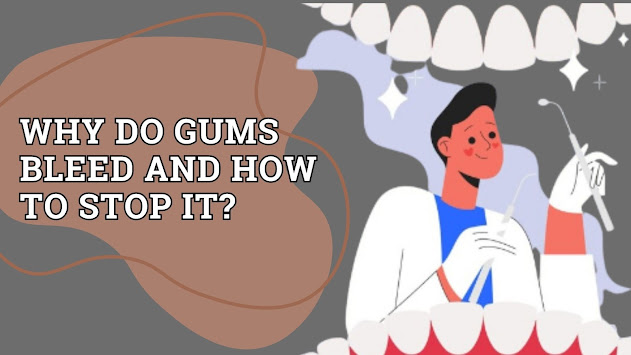Why Do Gums Bleed and How to Stop It?
Poor oral hygiene and other dental issues can cause your gums to bleed. While bleeding gums during brushing or flossing is a common issue that is typically ignored, it may be a sign of more serious oral health problems. Dr. Kevin Molldrem says that your gums may be bleeding due to incorrect brushing techniques, plaque buildup, or some other dental issues, which can lead to many oral health problems like gingivitis, bad breath, inflammation, and damage to your gum tissues.
Let’s discuss some common reasons for bleeding gums and see the solution to prevent this problem and maintain good oral health:
Common reasons behind gum bleeding:
Gingivits
Gingivitis refers to the situation where plaque layers build up around the gums. It is a kind of hard layer, and its bacteria irritate the gums and cause gum bleeding. It can be removed by brushing harder. Some people think that hard brushing prevents plaque buildup, but it can cause more bleeding, swollen gums, and redness.
Wrong brushing techniques
Inappropriate, strong, and vigorous brushing techniques can also result in gum bleeding. Dentists always recommend using a soft brush because it is better and easier on your gums; your gums can bleed if you use a new or hard brush. Brushing aggressively and vigorously causes gum bleeding.
Incorrect flossing
Incorrect and improper flossing techniques also lead to bleeding gums. If you floss regularly but your gums start bleeding suddenly, it may be due to the wrong flossing techniques. See a doctor if you consistently experience bleeding gums after flossing. Your gums may bleed if this is your first time flossing.
Health issues
Dr. Kevin Molldrem says that bleeding gums can also indicate serious health issues and conditions like diabetes, lack of vitamin, luekemia, etc.
Diabetes can cause swollen gums and oral infections, which lead to gum bleeding.
Deficiency of vitamin C and vitamin K also leads to gum bleeds, as vitamin C strengthens your bones and teeth while vitamin K prevents blood clotting.
Luekemia is a type of cancer that affects your platelets and causes gum bleeding and other oral health issues.
Smoking
Regular smoking also leads to gum bleeding and other dental problems and issues. Your gums bleed due to bacteria present in your mouth, and smoking increases the bacterial rate in your mouth, resulting in bad breath, tissue damage, and bleeding gums.
Poor diet
Your diet plan plays a major role in your oral as well as overall health conditions. Stracty, sticky, and other items with added sugar promote plaque buildup around gum layers. This plaque layer leads to several infections and issues, causing bacteria to irritate your gums and tissues. Problems like inflammation, tooth decay, gum bleeding, and infection rise due to poor diet intake.
Ways to prevent gum bleeding:
Proper brushing and flossing
Proper brushing and flossing techniques help in prevention of bleeding gums and other dental issues.
Brush your teeth twice a day gently in circular motions.
Use soft brushes, which have soft bristles.
Floss in gentle rubbing motion using C shape technique around teeths
Diet plans
A balanced diet promotes a balanced lifestyle. A balanced and proper diet prevents oral as well as general health problems. Your diet plan should include:
Food items rich in vitamin C and vitamin K help to maintain strong teeth and bones and prevent blood clotting.
Items with less added sugar.
Crunchy fruits and vegetables, green leafy salad, and fruit salad.
Rinse mouth with salt water
Rinse your mouth regularly with warm, salt mixed water after every meal because:
The saltwater helps to prevent bacterial infections and gum disease.
The saltwater helps balance the pH level in mouth.
aids in preventing acid reflux and bad breath
Using medications and visiting dentists regularly
Take your dentist's appointment regularly and get professional cleaning treatment from the dentist, which is for cleaning the plaque layer and to prevent gingivitis, gum bleeding, infections, and dental issues. Use dentist recommended toothpaste, which helps repair tissue and maintain healthy, strong teeth and gums. You can also use mouthwashes and antibiotics.
Quit Smoking
Smoking promotes hundreds of serious health issues and problems, including oral and dental problems. Smoking can lead to cancer problems, heart disease, gum infections,etc. Smoking regularly makes your immune system weaker, which fails to fight plaque bacteria, which results in gum infection, damaged tissue, and, most importantly, gum bleeding.
Conclusion
In conclusion, there are various major factors behind your oral health issues and gum bleeding, but every problem has a solution; thus, gum bleeding can also be cured. Dr. Kevin Molldrem concluded that many people avoid the problem of gum bleeding and take it lightly, but it may cause serious issues and health conditions. Praticing above mentioned suggestions will help you in every aspect, including maintaining stress free balanced lifestyle, maintaining oral health, general health, or even preventing oral issues by analyzing the problems and do’s and don'ts.


.jpg)
Comments
Post a Comment